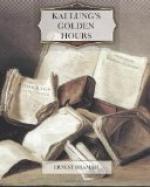Though no written record of this memorable interview exists, it is now generally admitted that Wei Chang either involved himself in an unbearably attenuated caution before he would reveal his errand, or else that he made a definite allusion to Fa Fai with a too sudden conciseness, for the slaves who stood without heard Wong Ts’in clear his voice of all restraint and express himself freely on a variety of subjects. But this gave place to a subdued murmur, ending with the ceremonial breaking of a plate, and later Wong Ts’in beat on a silver bell and called for wine and fruit.
The next day Fang presented himself a few gong-strokes later than the appointed time, and being met by an unbending word he withdrew the labour of those whom he controlled. Thenceforth these men, providing themselves with knives and axes, surrounded the gate of the earth-yards and by the pacific argument of their attitudes succeeded in persuading others who would willingly have continued at their task that the air of Wong Ts’in’s sheds was not congenial to their health. Towards Wei Chang, whose efforts they despised, they raised a cloud of derision, and presently noticing that henceforth he invariably clad himself in lower garments of a dark blue material (to a set purpose that will be as crystal to the sagacious), they greeted his appearance with cries of: “Behold the sombre one! Thou dark leg!” so that this reproach continues to be hurled even to this day at those in a like case, though few could answer why.
Long before the stipulated time the tenscore plates were delivered to Hien Nan. So greatly were they esteemed, both on account of their accuracy of unvarying detail and the ingenuity of their novel embellishment, that orders for scores, hundreds and even thousands began to arrive from all quarters of the Empire. The clay enterprise of Wong Ts’in took upon itself an added lustre, and in order to deal adequately with so vast an undertaking the grateful merchant adopted Wei Chang and placed him upon an equal footing with himself. On the same day Wong Ts’in honourably fulfilled his spoken word and the marriage of Wei Chang and Fa Fai took place, accompanied by the most lavish display of fireworks and coloured lights that the province had ever seen. The controlling deities approved, and they had seven sons, one of whom had seven fingers upon each hand. All these sons became expert in Wei Chang’s process of transferring porcelain embellishment, for some centuries elapsed before it was discovered that it was not absolutely necessary to sit upon each plate to produce the desired effect.
This chronicle of an event that is now regarded as almost classical would not be complete without an added reference to the ultimate end of the sordid Fang.
Fallen into disrepute among his fellows owing to the evil plight towards which he had enticed them, it became his increasing purpose to frequent the house beyond the river. On his return at nightfall he invariably drew aside on reaching the bridge, well knowing that he could not prudently rely upon his feet among so insecure a crossing, and composed himself to sleep amid the rushes. While in this position one night he was discovered and pushed into the river by a devout ox (an instrument of high destinies), where he perished incapably.




